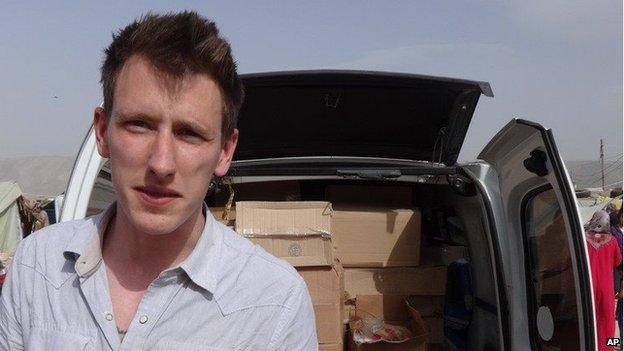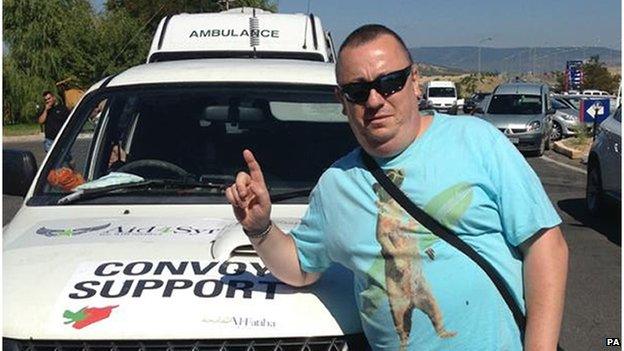US hostage Peter Kassig's family in video appeal
- Published
In the video, Abdul-Rahman Kassig's parents urge his captors to "show mercy"
The parents of US hostage Peter Kassig have appealed in a video to Islamic State (IS) militants to "show mercy" and release him.
Calling their son by the name he now uses, Abdul-Rahman, Ed and Paula Kassig say they are proud of their son and his aid work.
It follows the release of an IS video on Friday, which showed the beheading of British aid worker Alan Henning.
That video ended with a threat to kill 26-year-old Mr Kassig.
It was the fourth such video released by the group calling itself Islamic State.

Peter Kassig was working for the relief organisation SERA when he was captured, his parents said
Previous victims were American reporter James Foley, American-Israeli journalist Steven Sotloff and British aid worker David Haines.
Mr Kassig's parents said he had been working for the relief organisation he founded, Special Emergency Response and Assistance (SERA), when he was captured a year ago on his way to Deir Ezzour in eastern Syria.
Eid appeal
In the video Mr and Mrs Kassig appear on a sofa. Paula Krassig is wearing a headscarf and clutching a photo of their son.
Speaking to the camera Mr Kassig explains that his son founded an aid organisation to help the Syrian people, and refers to their son's conversion to Islam.
But violence, he says, is not a solution to the problems that trouble us all.
Mr Kassig says they have asked Washington to change its actions, but that "we have no more control over the US government than you have over the breaking of dawn".
Mrs Kassig then delivers a direct message to her son: "Our hearts ache for you to be granted your freedom," she says "so we can hug you again, and then set you free to continue the life you have chosen - the life of service to those in greatest need."
In a written statement accompanying their video, they add: "As Muslims around the world, including our son Abdul-Rahman Kassig, celebrate Eid al-Adha, the faith and sacrifice of Ibrahim, and the mercy of Allah, we appeal to those holding our son to show the same mercy and set him free."

The threat to kill Mr Kassig came in a video apparently showing the murder of UK aid worker Alan Henning
Islamic State may hold many more hostages.
On Friday, the father of John Cantlie, a British photojournalist held by the group, appealed for his release in a video, describing his son as a friend of Syria.
The Islamic State group has its roots in al-Qaeda's Iraqi affiliate but was expelled over its brutal tactics and refusal to obey orders to confine its activities to Iraq.
It grew more powerful amid the three-year civil war in Syria, launching a lightning offensive this summer that captured considerable territory in both countries.